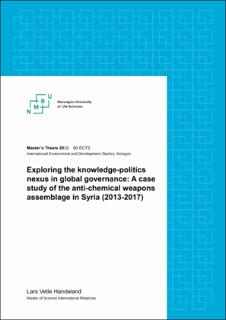| dc.description.abstract | This thesis explores the relationship between knowledge and politics in global governance today. To do so, I conduct a case study of the efforts to disarm and govern the use of chemical weapons in Syria between 2013 and 2017. Official documents from this time-period are analyzed by way of assemblage thinking. This perspective directs attention to the practices of assembling coupled with a sensitivity to processes of (de)stabilization.
Doing so helps me develop the argument that during the course of this process, the knowledge-politics nexus was performed according to a linear understanding. In this view, knowledge production is to inform political decision-making in a unidirectional way. This practice of delineating knowledge production and politics into two separate spheres was important for establishing a Russian-American consensus. Indeed, it allowed for cooperation on chemical weapons in Syria by isolating the issue from other dimensions of the conflict and, in doing so, stabilized what was perceived to be an apolitical and technical form of expertise.
During the post-disarmament phase (2015-2017), the same practice of separating the two turned into a source of tension between Russia and the US. More specifically, following continued allegations of chemical attacks even after the declared stockpiles had been destroyed in 2014, two new expert mechanisms were set up. Russia perceived these overstep their apolitical and technical mandates and took action to reshape their working methods.
However, the US and its allies viewed Russia’s actions as attempts at interfering with the neutral knowledge producing mechanisms. While these differing perspectives are in agreement that knowledge and politics should be kept separate, I demonstrate how this practice in global governance can be problematic. As such, I end up calling for new ways of thinking and speaking about the relationship between knowledge and politics. | en_US |

